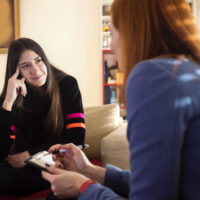Newsletter
Resources to Help Kids Thrive
This newsletter contains a weekly update of content from childmind.org featuring parenting advice, in-depth articles, and the latest thinking on children’s mental health and learning disorders.
Strategies for Communicating With Kids
January 21, 2025
Related Resources
DBT Skills for Parents
How to use the step-by-step DEAR MAN, GIVE, and STOP skills to talk to kids and teens.

DBT: What Is Dialectical Behavior Therapy?
A treatment for children and teenagers with trouble managing emotions.

Common Causes of Behavior Problems in Kids
Knowing what makes kids act out is the first step to finding solutions.

Teens and Anger
Tips to help teens recognize and process their emotions.

How Anxiety Leads to Problem Behavior
Kids who seem oppositional are often severely anxious.

ADHD and Behavior Problems
Tantrums, outbursts, and defiance are common in kids with ADHD. How can we help them behave better?

How to Model Healthy Coping Skills
Helping kids learn strategies for handling big emotions.

Interested in More Content Like This?
Sign up to get weekly resources like this delivered to your inbox.
